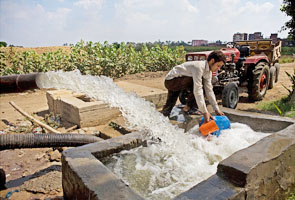 NDTV | One place to begin to understand why this parched country has nearly ruptured relations with its upstream neighbours on the Nile is ankle-deep in mud in the cotton and maize fields of Mohammed Abdallah Sharkawi. The price he pays for the precious resource flooding his farm? Nothing.
NDTV | One place to begin to understand why this parched country has nearly ruptured relations with its upstream neighbours on the Nile is ankle-deep in mud in the cotton and maize fields of Mohammed Abdallah Sharkawi. The price he pays for the precious resource flooding his farm? Nothing."Thanks be to God," Mr. Sharkawi said of the Nile River water. He raised his hands to the sky, then gestured toward a state functionary visiting his farm. "Everything is from God, and from the ministry."
But perhaps not for much longer. Upstream countries, looking to right what they say are historic wrongs, have joined in an attempt to break Egypt and Sudan's near-monopoly on the water, threatening a crisis that Egyptian experts said could, at its most extreme, lead to war.
"Not only is Egypt the gift of the Nile, this is a country that is almost completely dependent on Nile water resources," said a spokesman for the Egyptian Foreign Ministry, Hossam Zaki. "We have a growing population and growing needs. There is no way we can accept this kind of threat."
Ever since civilization first sprang forth here, Egyptians have clustered along the Nile's silt-rich banks. Almost all of the country's 80 million people live within a few miles of the river, and farmers like Mr. Sharkawi have hardly changed their farming methods in four millenniums. Egypt's population is growing briskly, however, and by the year 2017 at current rates of usage the Nile's water will barely meet Egypt's basic needs, according to the Ministry of Irrigation.
And that is assuming that the river's flow is undiminished. Under British colonial rule, a 1929 treaty reserved 80 percent of the Nile's entire flow for Egypt and Sudan, then ruled as a single country. That treaty was reaffirmed in 1959. Usually upstream countries dominate control of a river, like the Tigris and Euphrates, which are much reduced by the time they flow into Iraq from Turkey and Syria. The case of the Nile is reversed because the British colonials who controlled the region wanted to guarantee water for Egyptian agriculture.
The seven upstream countries -- Ethiopia, Uganda, Tanzania, Kenya, the Democratic Republic of Congo, Burundi and Rwanda -- say the treaty is an unfair vestige of colonialism, while Egypt says those countries are awash in water resources, unlike arid Egypt, which depends on just one.
Today's confrontation has unfolded in slow motion. In April, negotiations between the nine Nile countries broke down after Egypt and Sudan refused to give ground. The upstream countries quickly got together and in May came up with a formula that would free them to build their own irrigation projects and dams, reducing the flow to Lake Nasser, the vast man-made reservoir that straddles Egypt and Sudan.


0 comments:
Post a Comment